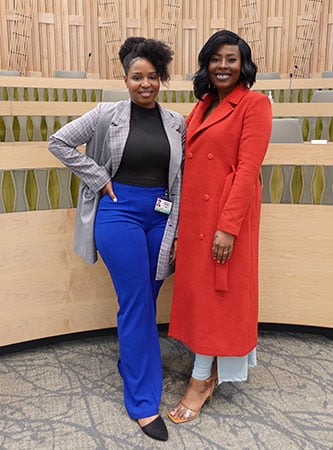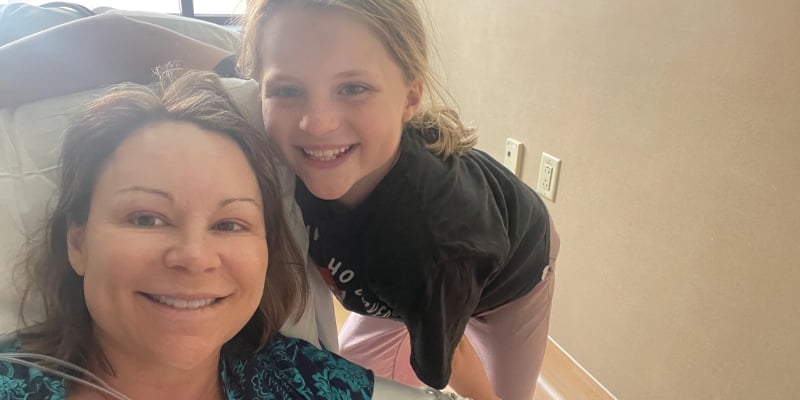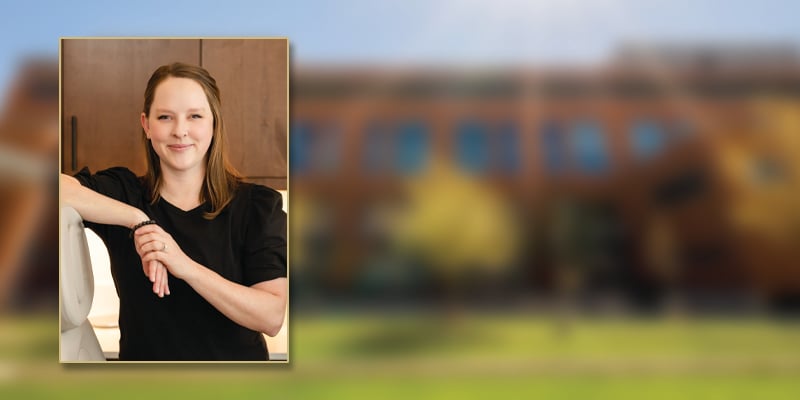It was a surreal moment for Danyelle Gilbert BSN (’21), RN, when she came to the University of Colorado College of Nursing at Anschutz Medical Campus in February.
“It was very much a rewarding feeling. I was thinking, ‘Oh my gosh, the college is thinking of me? You’re granting me this opportunity to speak to nurses and nursing students?’” she says. “But at the same time, I’m also thinking ‘I’m going to take this opportunity to express my gratitude and speak life into them because I know what it’s like to be in their shoes’.”

BS in Nursing student Shashalee Sangster (left) with CU Nursing alumna Danyelle Gilbert (right) at the college's Saving Our Black Mother panel discussion in February. |
The CU Nursing alumna was part of a panel discussion called Saving Our Black Mothers, an event bringing awareness to Black maternal mortality. She works as a labor and delivery nurse.
“It’s important to give insight into what I’m doing as a nurse and give students motivation,” she says. “Nursing school isn’t a breeze or a walk in the park. It’s hard. I don’t want to be triggering, but I want to stir up emotions for people to understand and grasp the gravity of the profession they’re in. You’re dealing with patients' lives – but you — as a nurse or a student – are important. You’re brave and courageous.”
Navigating the Real World
Gilbert admits being a nurse is a formidable activity in the real world. She says CU Nursing prepared her for her career – and adds while there are a lot of things you can mentally prepare yourself for – nothing compares to actually doing it.
When she graduated, Gilbert worked as a postpartum nurse and eventually transitioned to labor and delivery.
“I’ve had my struggles,” she says. “I’ve had challenges. As a nurse, you’re managing a lot of tasks while having to critically think and use your best nurse judgment, and that can be very challenging – especially coming right out of nursing school as a new grad, or if you’re transitioning to a new nursing role.”
One thing Gilbert has struggled with is imposter syndrome and says it’s something a lot of nurses face.
“Who am I to take care of this patient’s life and have so much power? Not power of authority, but power in care, assessments, and interventions,” she says. “The assessments I perform ensure the patient is still stable. And if they are declining or not stable, what interventions do I need to be doing? I think of it as I get to. I get the opportunity to care for people. I value that trust.”
Gilbert also acknowledges at some point a nurse will make a mistake. During her time at CU Nursing, Gilbert read an article called “To Err is Human” and said the article did not resonate with her until she made a mistake at her job.
“The first time I made a medication error as a nurse was devastating. Thankfully, it did not cause severe harm. The last thing I want to do is harm anyone or be the reason a mother and her baby had anything but a healthy birth experience,” she says. “But nurses need to remember, we’re all human and we do make mistakes.”
There was a point in her career that she thought about giving up. But she took time for self-reflection and decided that nursing was the career for her.
“I think it’s so important as a nurse to have good self-awareness,” she says. “Are you someone who can work in a critical care setting, or is a different nursing path right for you?”
Finding Your Nursing Path
She says there’s a stigma that every nurse must work in the ICU or critical care units for marketability and/or “prestige.” Gilbert says not everyone is built or prepared to work in a high-stress, fast-paced environment and feel confident about making quick decisions. Those environments can be breeding grounds for burnout and mental health issues related to being in a constant state of high-functioning anxiety.
Colorado Council of Black Nurses |
|
Gilbert is a member of the Colorado Council of Black Nurses. She’s been involved with the organization since 2019 when she first came to campus because she wanted to have somewhere – and someone – to turn when starting at CU Nursing.
“I wanted someone available to answer my questions,” she says. “How do I study? What’s the best and most effective way to do that? Being a minority, what does it look like for me when it comes to interacting with my peers? Will I have a voice?”
Information about the Colorado Council of Black Nurses:
|
“It takes time to develop critical thinking skills and nurse judgment,” she says. “It’s important as nurses that we are aware and own who we are and the type of nursing you want to do – and knowing that all of it matters. There is no one specialty better than others. We are all caring for people at different points in their lives and different stages of their health and all of that matters. We need all kinds of nurses.”
It’s why Gilbert wanted to return to CU Nursing to speak to students to share her experience. She wanted to share her wisdom and support students as they transition into roles as nurses.
“I’m struggling through my challenges in my career, but I’m able to speak to these students and convey to them my experiences,” she says. “Not everything in nursing is glitz, glam, and sprinkles. There are sometimes when things are grimy and muddy, and a nurse needs to understand how to balance those things.”
“You’re going to be challenged in your nursing career,” she adds. “You must be vigilant with your patients and understand the importance of what you do and the outcomes that are a direct result of your choices. Nursing students must also remember to make space for grace and understand that in the beginning, you’re learning. But you’ll get through it – don’t give up on yourself.”
Reflecting on Her Time at CU Nursing
Gilbert graduated with a BS in Nursing through the college’s Integrated Nursing Pathway (INP) program. She enjoyed the program because when she came to campus with her cohort from Community College of Denver, she had already formed friendships and had a built-in support system.
“When I was in school, I was a single mother with a two-year-old, so coming to campus without knowing anyone would have been very intimidating,” she says. “It was so nice to have a support system, and it was great to take that support system into a larger cohort. When those two cohorts meshed (INP and TRAD), it was great.”
She says coming to campus for study sessions is one of her favorite memories because it helped motivate her to study and learn materials from her classmates’ different learning styles.
“Our study sessions were like a big group of neurons firing around a little room,” she says. “We were bouncing ideas and thoughts off each other – it was like fireworks. We were all thinking ‘We had no idea what we were talking about,’ but it helped make all of this information stick, and we could support each other. I was so happy and so grateful.”


